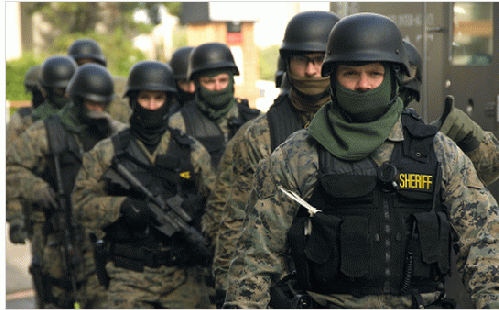The SWAT team is the big guns of policing in the United States, reserved for kidnappings, gunmen and other highly dangerous and potential volatile situations. Right?
Wrong, apparently, because in recent years, the use of SWAT teams for routine law enforcement matters has been on the rise, with sometimes fatal consequences. These highly trained police personnel are being sent out on gambling raids, ordered to break up underage parties and even dispatched to handle student loan fraud. Not the best use of taxpayer resources, given the expense of maintaining a SWAT team and sending members out on calls, but more than that, it's a troubling indicator of something going deeply wrong in America.
In the United States, the police are kept separate from the military for a number of social and political reasons. Paramilitary forces like SWAT teams, developed in 1960s Los Angeles to address considerable social unrest, are intended to be used judiciously, in situations where a threat to civilian wellbeing and social stability is so significant that it justifies the use of considerable force and organized military tactics against members of the civilian community.
Thus, a potential terrorist threat or situations in which people's lives are endangered by a gunman or another threat of violence is an appropriate use of a SWAT team or similarly-trained arm of a police department.
But what about routine law enforcement situations? These are supposed to be the purview of the police, who are trained in how to handle them, and when to determine if they need more substantial backup. When a police raid includes a SWAT team, the mix can turn explosive and dangerous extremely quickly; and police killings, particularly of young black men, are a problem across the United States thanks to the criminalization of ordinary activities like walking down the street in baggy jeans or even existing while black.
Such activities are also including searches under nebulous circumstances, the use of excessive force, and other abuses of law enforcement power that have a net effect of intimidating civilians. This is a troubling development in a nation that enshrines civil liberties and the ability to live without interference from police forces unless clear evidence of lawbreaking is occurring, and it's evident that some police forces and their SWAT teams are overstepping boundaries, sometimes with inadequately trained personnel who aren't prepared to deal with the complexity of a chaotic raid situation.
Absurdly, celebrities like Shaquille O'Neal and Steven Seagal are being "deputized" onto SWAT teams without any formal training, but it's not just an honorary position. They're going out with police officers into situations that involve contact with civilians, despite the fact that they aren't prepared, and the results might seem comic on the news -- Seagal driving a tank into a man's living room, for example -- but they are indicative of a seriously problematic trend in law enforcement, one in which heavily-armed law enforcement are flooding the homes and businesses of people who may not necessarily have committed crimes and don't pose a significant public safety risk.
The CATO Institute has a grim map of paramilitary incidents like raids that went horribly wrong, and it provides a bleak picture of a United States struggling with deep internal conflicts when it comes to making decisions about policing and civil liberties. Since the September 11 attacks in 2001, a growing chokehold on civil liberties has occurred to the steady beat of a nationalistic drum, and while many of these liberties have slipped away in bits and pieces, creating a subtle slide into a more militaristic nation, civilians are clearly aware of the issue, and they're not happy with it.
Has policing in the United States evolved to the point of no return, making it impossible to dial it back and put SWAT teams back where they belong? Or can organizers and advocates push for a return to the basics when it comes to policing, paired with more conscientious treatment of civil liberties?
Sign this petition to tell Canadian Police to not to taze first and ask questions later to keep citizens safe.
Reprinted from care2.com






